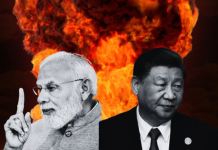Terror launch pads in Pakistan-controlled-Kashmir are full and active, but the Pakistan Army’s efforts to push in terrorists under the guise of ceasefire violations are being answered to in a “hard and punishing” manner, said Lieutenant General Kanwal Jeet Singh Dhillon of the Indian Army.
Donald Trump Incited Indian PM Narendra Modi To Revoke Article 370 From Kashmir – US Report
Dhillon said peace in the Kashmir Valley has been “cemented by security forces in coordination with various stakeholders including opinion-makers and mentors of the civil society”.
“All the terrorist camps and launch pads in Pakistan-occupied Kashmir are full. These terrorist cadres are desperate to infiltrate with the help of Pakistan army, who indulge in firing at our posts. “Our befitting response to ceasefire violations has been swift, hard and punishing,” Lt Gen Dhillon told PTI.
He said the Army’s main task is to keep terrorism at bay, both at the LoC and in the hinterland in “conjunction with Jammu and Kashmir police, paramilitary forces and intelligence agencies.” While maintaining effective domination along the LoC, he said, conducting effective anti-terror operations “in a people-friendly manner” in the inner areas has improved the situation in the Valley.
Earlier, Indian defence minister Rajnath Singh said that the Pakistan army was involved in a total of 3,479 ceasefire violations along the Jammu and Kashmir border in 2019. In a written reply to a question in Rajya Sabha, Singh said that 13 Indian Army personnel and two soldiers of the Border Security Force (BSF) were killed in action in 2019 due to ceasefire violations (CFVs) and cross border firing (CBF).
“Very often terrorists attempting to carry out reconnaissance to facilitate infiltration also become casualties and these are then depicted as civilian casualties to portray India’s action as being aggressive,” Rajnath Singh said.
“Such depiction is done to attract the attention of international media to CFVs and CBF, and distract the attention from the support provided to terrorists, who are trained by Pakistan in POJK (Pakistan-occupied Jammu and Kashmir) and its other areas,” Rajnath Singh said.
Meanwhile, 2019 was a tense year for India and Pakistan. In February, a local Kashmiri man in the town of Pulwama staged a suicide bombing that killed over 40 Indian security forces—the deadliest attack in Kashmir in three decades.
Jaish-e-Mohammad—a Pakistan-based terror group with close ties to Pakistan claimed responsibility. India retaliated by scouting fighter jets and launching limited strikes on terror training camps, for the first time since a war in 1971.
Soon thereafter, Pakistan claimed it had carried out six airstrikes in Kashmir to showcase its might, and also shot down an Indian fighter jet and captured the pilot. The confrontation de-escalated after the Imran Khan government released the pilot almost within 48 hours after New Delhi covertly threatened to go all against Pakistan.
Then, in August, India withdrew the special status of Jammu and Kashmir to completely integrate the region with the country. New Delhi also imposed a security lockdown in Kashmir and enforced a communication blackout. For Islamabad, which fully claims Jammu and Kashmir retaliated by expelling India’s envoy from Islamabad and suspending trade with New Delhi. Pakistan ever since has left no stone unturned to highlight the Kashmir issue.




